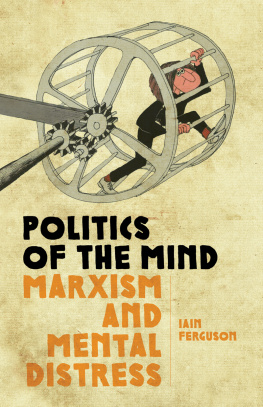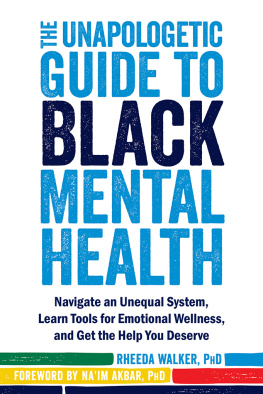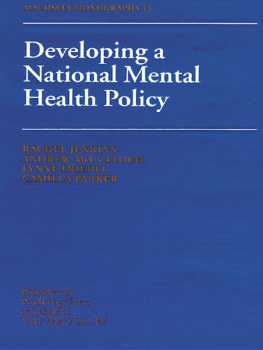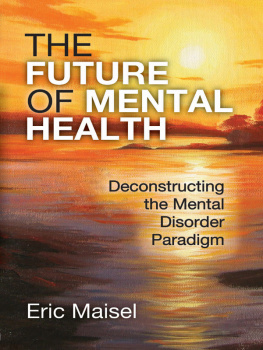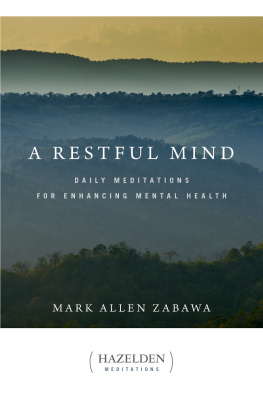Essential reading for those concerned politically, personally and professionally with mental healthone of the key public issues of the 21st century. In Politics of the Mind Ian Ferguson provides a persuasive account of why and how capitalism shapes the high levels of mental distress we are experiencing. Lucidly written and drawing on a range of past and current sources, this book spans analysis and ways of collectively challenging the situation we find ourselves in.
Ann Davis, Emeritus Professor of Social Work and Mental Health, University of Birmingham
This book is a welcome return to a Marxist view of mental health debates. Ferguson writes clearly about a complex topic and he invites the reader to consider an important social materialist perspective, which avoids the pitfalls of both biomedical and postmodern assumptions. An excellent read!
David Pilgrim, Professor of Health and Social Policy, University of Liverpool
Iains book is an unique contribution to understanding mental distress. We live in a mad world where its hard to remain sane. Iain takes us through the story and why we dont have to live this way. I recommend this book to all mental health workers.
Salena Williams, senior nurse at liaison psychiatry Bristol Royal Infirmary and unison international officer
With this short text Iain Ferguson has provided us with a resource of hope, so badly needed given the current crisis in mental health that is set out clearly at the beginning of the book. This hope comes in large part from the challenges being made to the dominant biomedical model of mental ill-health, not only by the service user movement and those critical psychiatrists and psychologists whom the author rightly credits, but by the group of radical social workers that includes Iain at its centre. Teeming with insights into the crucial interaction between individual and social experience, this book will play a part in supporting the collective struggles required for more and better mental health services, and for a better world.
Guy Shennan, Chair, British Association of Social Workers, 2014-2018
A hugely impressive achievement. Compact and accessible, Fergusons book is particularly strong on the debates around psychoanalysis and anti-psychiatry. His clear but nuanced perspective includes a strong sense of solidarity with those working or living with mental distress. A powerful indictment of a maddening society as well as a timely and urgent contribution to the fight for a better world.
Roddy Slorach, author of A Very Capitalist Condition: A History and Politics of Disability
The society we live in is producing an epidemic of mental ill health and this is making mental distress into a major social and political issue. The issue is both one of resources, continually under attack from neoliberal governments, and one of analysishow we understand and respond to distress. Ian Fergusons excellent study navigates these complex questions with skill, humanity and, crucially, socialist politics: a book for our times.
John Molyneux, socialist writer and activist and editor of Irish Marxist Review
About the author
Iain Ferguson is Honorary Professor of Social Work and Social Policy at the University of the West of Scotland. He is a co-founder of the Social Work Action Network and is author of several books including Radical Social Work in Practice (with Rona Woodward, Policy Press, 2009) and Global Social Work in a Political Context: Radical Perspectives (with Michael Lavalette and Vasilios Ioakimidis, Policy Press, 2018). He is co-editor of the journal Critical and Radical Social Work and is a member of the editorial board of International Socialism.
Politics of the Mind
Marxism and Mental Distress
Iain Ferguson

Politics of the Mind: Marxism and Mental Distress
Iain Ferguson
Published 2017 by
Bookmarks Publications
c/o 1 Bloomsbury Street, London WC1B 3QE
Bookmarks Publications
Typeset by Peter Robinson
Cover design by Ben Windsor
Printed by Short Run Press Limited
ISBN 978-1-910885-65-9 (pbk)
978-1-910885-66-6 (Kindle)
978-1-910885-67-3 (ePub)
978-1-910885-68-0 (PDF)
Contents
Foreword
THIS short book has been a long time in the making. I first read R D Laings The Politics of Experience as an 18-year-old in the early 1970s and, like many others of my generation, was blown away by Laings central argument that madness could be intelligible, had a meaning which was somehow related both to the way some families operated and also to the wider operation of capitalist society. For all their theoretical and political shortcomings, some of which will be discussed later in this book, Laings writings were one important factor in leading me and many others of the 68 generation to begin to question capitalism and the ways in which it shaped family life and mental health. The recent biopic of his life, Mad to Be Normal, starring David Tennant as Laing, is likely to rekindle debate and discussion around his ideas.
Since then, several other factors have also been important in deepening my interest in, and understanding of, mental health issues. While employed as a social worker in a psychiatric hospital in the late 1980s, I was fortunate to work over a two-year period with a support group for family members of people given a diagnosis of schizophrenia. The experience highlighted the practical and emotional challenges of caring for a son, daughter or sibling suffering from a severe psychotic condition and these families own need for support. The current crisis in mental health provision, discussed in the opening chapters of this book, means that in reality such families are now left with even less support than they had then. Whatever ideological differences and debates there may be regarding the nature of mental distress, building unity in action between campaigning organisations of service users on the one hand and carers organisations on the other remains an important political task if further cuts to services are to be prevented.
Later, as a social work academic, I was involved in undertaking qualitative interview-based research over ten years with different groups of people experiencing mental health problems including asylum seekers, people given the label of personality disorder and service users who were actively involved in managing services or playing a leading role in campaigning organisations. What was most fascinating about these conversations is that the issue of diagnosis rarely came up. Instead, people talked about their lives, the experiences (good and bad) that they had and the ways in which they understood and coped with their mental distress. I feel privileged to have been part of these conversations and learned a huge amount from them.
My own experience of anxiety and depression in my early thirties, triggered by stress and political burnout, forced me to address some previously unquestioned assumptions shaping my life and activities. The experience was a painful one and not one I would be in a hurry to repeat, but it was a valuable one nevertheless and one from which I learned a great deal.
Lastly, as a political activist, I have been involved over the years in many different campaigns around mental health as a socialist, a trade unionist and a member of the Social Work Action Network. Most recently these have usually been around the defence of services against cuts or even closure. What has been most inspiring about these campaigns, even when not successful, is the degree of unity they have succeeding in achieving between service users, trade unionists, professionals and campaigning organisations.
Next page
